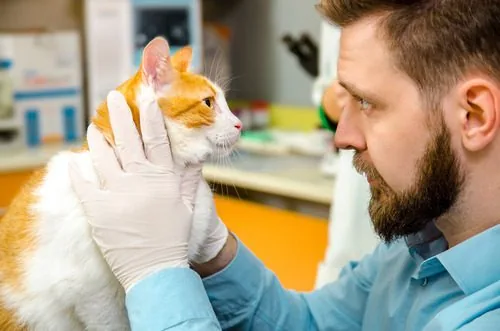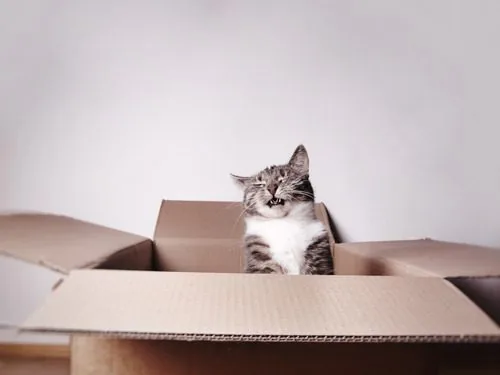Cat Eye Infection – Signs and Treatment Options
Eye issues in cats can seem minor at first, but even mild symptoms can point to an underlying cat eye infection that needs veterinary attention. If you’ve noticed your cat squinting, pawing at their eye, or waking up with thick discharge around their eyelid, it’s time to take a closer look. Cats rely on their vision and comfort to move confidently through their day and eye infections can make life uncomfortable fast. This blog breaks down the most common signs of a cat eye infection, what might cause it, and what to expect when your veterinarian recommends treatment. If you live in or near Plymouth Meeting, PA, our team at Veterinary Village is ready to help.

Recognizing the Signs of a Cat Eye Infection
A cat eye infection doesn’t always start with dramatic symptoms. Sometimes, pet owners notice just a slight change. Maybe a little more squinting than usual or a bit of redness in one eye. These subtle signs can quickly develop into something more severe if left untreated. Since cats are excellent at masking discomfort, it’s important to observe their eyes and facial expressions closely.
Physical Symptoms
You may see one or several of the following signs:
- Redness or inflammation in or around the eye
- Cloudy appearance of the cornea
- Excessive tearing or eye discharge (clear, yellow, green, or crusty)
- Swollen eyelids
- Squinting or keeping one eye closed
- Rubbing or pawing at the eye
Discharge is one of the most visible signs of a cat eye infection. Clear discharge may indicate viral involvement, while green or yellow discharge often points to bacterial infection. In either case, prompt veterinary evaluation is necessary.
Changes in Behavior
Beyond the physical signs, you may also notice your cat behaving differently. Some cats become less active or retreat to quiet spaces when they’re uncomfortable. Others might become more vocal or irritable. If your typically social cat suddenly starts hiding or avoids light, they could be struggling with an eye infection or irritation.
Common Culprits: Unveiling the Causes of Cat Eye Infections
Cat eye infections can stem from a range of causes, including viruses, bacteria, and even environmental factors. Your vet will consider your cat’s age, health history, and symptoms when diagnosing the source.
Viral Infections
Feline herpesvirus (FHV-1) is one of the most common causes of viral cat eye infections. It’s highly contagious and can remain dormant in a cat’s system, causing flare-ups during times of stress or illness. Conjunctivitis caused by FHV-1 may present with redness, discharge, and frequent blinking.
Bacterial Infections
Bacterial infections often occur alongside viral infections or when the eye is injured. Chlamydophila felis and Mycoplasma are two common bacterial culprits in feline eye infections. These infections usually cause moderate to heavy discharge, as well as swelling of the conjunctiva (the pink tissue around the eye).
Environmental Irritants and Injuries
Dust, pollen, smoke, and harsh cleaning chemicals can irritate your cat’s eyes and create the perfect environment for a secondary infection. Scratches from rough play or foreign bodies in the eye, such as grass seeds, can also lead to infection if not addressed promptly.
Diagnosing a Cat Eye Infection at the Vet
Bringing your cat to your veterinarian is the only way to receive an accurate diagnosis and proper treatment plan for a cat eye infection. The signs you observe at home help start the conversation, but your vet will need to examine your cat thoroughly.
Physical Examination
Your veterinarian will begin with a physical exam of the eyes, checking for swelling, discharge, and signs of trauma. They may also check your cat’s lymph nodes, oral health, and respiratory condition to assess for systemic involvement.
Diagnostic Testing
To identify the exact cause of your cat’s eye infection, your vet may perform:
- Fluorescein staining – a dye test to check for corneal ulcers or scratches
- Schirmer tear test – to evaluate tear production
- Eye pressure test (tonometry) – to rule out glaucoma
- Conjunctival swabs – for bacterial culture or viral PCR testing
Accurate diagnosis is key to treating a cat eye infection effectively. In some cases, what appears to be a simple infection might be part of a larger respiratory or systemic issue.
How Are Cat Eye Infections Treated?
Once your veterinarian determines the cause of the cat eye infection, they’ll recommend the appropriate treatment. The right course of action depends on whether the infection is viral, bacterial, or related to environmental or physical trauma.
Prescription Eye Medications
Veterinarians often prescribe topical eye medications like antibiotic drops or ointments for bacterial infections. If the infection is linked to a virus, antiviral eye medications or oral medications may also be used. Administering eye medications to a cat can be challenging, but your vet will demonstrate the technique and may suggest ways to make the process smoother at home.
Supportive Care and Monitoring
In addition to medication, your vet may suggest supportive care. This could include keeping your cat indoors during recovery, using warm compresses to ease discharge, and monitoring their hydration and eating habits. Follow-up appointments are often necessary to ensure the infection resolves without complications.
When to Schedule a Veterinary Appointment
Any time you notice a possible sign of a cat eye infection, it’s best to contact your veterinarian right away. Waiting too long could allow the infection to worsen, potentially affecting your cat’s vision or causing unnecessary discomfort. Cats with pre-existing conditions or weakened immune systems are especially vulnerable to complications. Kittens and senior cats also face a higher risk. Early intervention leads to better outcomes and less stress for your pet and for you.
If you’re located in or near Plymouth Meeting, PA, we welcome you to call Veterinary Village at (484) 820-1700 or schedule an appointment online. Our veterinary team is experienced in diagnosing and treating a wide range of eye conditions in cats and can provide the expert care your pet needs.
Recent Posts
About Veterinary Village
Veterinary Village offers excellent service to clients in a comfortable, friendly atmosphere. To learn more about us and how we can better serve you and your pet here in Plymouth Meeting, PA, click the button below.
Share This Post
Recent Posts
About Veterinary Village
Veterinary Village is a network of three animal hospitals based in Atlanta, GA and the surrounding area. We offer honest, excellent service to our clients in a comfortable, friendly atmosphere. To learn more about our locations and how we can better serve you and your pet, click the button below.



